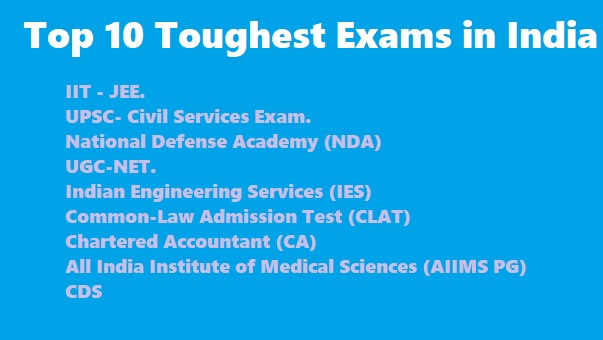Competitiveness is a fundamental aspect of our educational system as it brings out the best in students, fostering the development of their skill sets and creativity. Competitive exams play a vital role in assessing various attributes such as aptitude, mental acuity and technical competence. In India, there is an extensive array of examinations conducted annually, with most being relatively easier to pass, while only a select few are recognized for their exceptional difficulty. So, in this article, we will discuss the “Top 10 Toughest Exams in India to Crack in 2024.” Let’s get started!
Top 10 Toughest Exams in India

JEE (Joint Entrance Examination):
The Joint Entrance Examination (JEE) is a nationwide engineering entrance exam conducted by the Joint Seat Allocation Authority (JoSAA). It comprises two levels: JEE Main and JEE Advanced. JEE Main includes NITs, IIITs, CFTIs, and IIEST Shibpur for its dual degree program. Only those shortlisted from JEE Main can appear for JEE Advanced, which is essential for admission to IITs and the Indian School of Mines, Dhanbad. The competition is fierce, with only the top 1.5 lakh candidates out of approximately 12.7 lahks who took the exam in 2016 qualifying for JEE Advanced.
UPSC Civil Services:
The Union Public Service Commission (UPSC) conducts the Civil Services exam to select candidates for prestigious positions within the Central Government, including IAS, IPS, IRS, and IFS. Widely regarded as one of the most challenging government exams in India, the success rate is less than 1%. The examination is conducted in two stages: the Preliminary Examination and the Main Examination. The entire process takes about a year, from the preliminary test to the final results.
Chartered Accountancy (CA) Exam:
The CA exam is a prestigious three-level examination conducted by the Institute of Chartered Accountants of India (ICAI). It begins with the Common Proficiency Test (CPT) and progresses to the Integrated Professional Competence Course (IPCC), covering seven subjects distributed into two groups. The most challenging level is the CA Final Examination, which is renowned not only in India but also globally. The success rate for this exam ranges from 8% to 16%, depending on the demand for Chartered Accountants in the country.
AIIMS (PG) Entrance Exam:
The All India Institute of Medical Sciences Entrance Exam serves as a gateway for admission to MD/MS post-graduate courses. Conducted twice a year, each session offers around 124 seats. As a result of this strict reservation system, clearing the AIIMS (PG) Entrance Exam is considered one of the toughest challenges in India, making it a test only the most deserving candidates can conquer.
CAT (Common Admission Test):
CAT is conducted by the Indian Institutes of Management (IIMs) for admission to their prestigious business administration programs. Held annually by one of the IIMs, CAT assesses candidates based on their aptitude and language skills. Additionally, the Indian Institutes of Technology (IITs) and the Indian Institute of Science (IISc) also utilize CAT scores for admissions to their management programs, replacing the previously conducted Joint Management Entrance Test (JMET).
GATE (Graduate Aptitude Test in Engineering):
GATE is a highly competitive examination jointly conducted by the Indian Institute of Science and seven Indian Institutes of Technology (IITs) on behalf of the National Coordination Board – GATE and the Department of Higher Education under the Ministry of Human Resources Development (MHRD), Government of India. Moreover, several Indian public sector undertakings rely on GATE scores for recruiting graduate engineers in entry-level positions.
NEET (National Eligibility Entrance Test):
NEET, formerly known as the All India Pre-Medical Test (AIPMT), is the entrance exam for MBBS and BDS programs at medical and dental institutes across India. Conducted by the National Testing Agency (NTA) annually in May, NEET offers around 90,000 seats in MBBS and BDS colleges. NEET is a crucial step for those aspiring to pursue a career in the medical field, and success in this exam is pivotal during the counseling session for seat allocation.
NDA (National Defence Academy):
The National Defence Academy (NDA) is a joint services college of the Indian Armed Forces where cadets from the Army, Navy, and Air Force undergo training together. To enroll in the military, candidates must pass the NDA exam, which is conducted twice a year in April and September by the UPSC. Due to the high number of applicants and the limited seats, clearing the NDA exam is a challenging task.
UGC-NET (National Eligibility Test):
UGC-NET is a challenging exam meant only for post-graduates, making it tough to clear. The test aims to shortlist candidates for the roles of Assistant lecturers and Junior Research Fellowship (JRF) in schools and colleges. Additionally, since 2013, successful UGC-NET candidates are eligible for employment in Public Sector Undertakings (PSUs) in various verticals such as science (R&D), management, corporate communications, HR, and finance.
IES (Indian Engineering Services):
The Indian Engineering Services (IES) exam is a three-stage, combined competitive exam conducted by UPSC for mechanical and managerial positions in the Government of India. The selection process includes a General Aptitude Test, an Objective Technical paper, a Technical paper, and an Interview. IES offers highly lucrative jobs, making it one of the most sought-after and toughest exams in India.
CLAT (Common Law Admission Test):
CLAT is the gateway to admission to 16 National Law Universities in India. The test comprises multiple-choice questions on Elementary Mathematics, English, General Knowledge, Legal Aptitude, and Logical Reasoning. Additionally, many private law schools in India also accept CLAT scores for admissions.